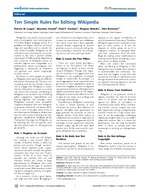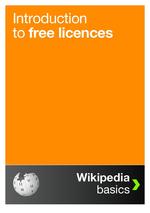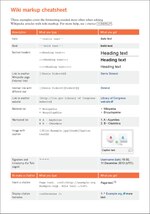Wikipedia training day, Gold Coast Libraries




This page documents an introductory Wikimedia training day for staff and community members of the Gold Coast Library. The objective is to see Gold Coast Libraries working with the State Library of Queensland in their effort to engage the Wikimedia projects.
Wikimedia Australia and La Trobe University have sponsored the event with a trainer, and The City of the Gold Coast has provided the venue and catering.
Details
[edit]- Tuesday 4 June 2013, from 9am–4pm
- Palm Beach Community Lounge and Library
Participants
[edit]- GCLisa (talk) 00:45, 4 June 2013 (UTC)
- Kazlb (talk) 00:41, 4 June 2013 (UTC)
- Kimberleywilde (talk) 00:39, 4 June 2013 (UTC)
- Emilina27 (talk) 00:42, 4 June 2013 (UTC)
- Nikko73 (talk) 00:39, 4 June 2013 (UTC)
- Kerryleeo (talk) 00:41, 4 June 2013 (UTC)
- Coastal.culture.vulture (talk) 00:43, 4 June 2013 (UTC)
- Zadad (talk) 00:39, 4 June 2013 (UTC)
- Lisagc (talk) 00:41, 4 June 2013 (UTC)
- Danica monk (talk) 00:39, 4 June 2013 (UTC)
- TenielleH (talk) 00:41, 4 June 2013 (UTC)
- Starfish2425 (talk) 00:40, 4 June 2013 (UTC)
- Mookie Baker (talk) 00:43, 4 June 2013 (UTC)
- 120.29.5.222 00:42, 4 June 2013 (UTC)
- Craig Franklin - Wikimedia Australia liaison
- Leighblackall – Wikimedia trainer
- Apologies
Schedule
[edit]- Create a Wikimedia Outreach userpage
- Create a userpage on another Wikimedia userpage and link them
- Use talk pages
- Start or edit a Wikipedia page
- Upload an image to Wikimedia Commons
- Discussion on Gold Coast community work through Wikimedia projects
Feedback
[edit]Thanks for the training. It was very informative and we now have a page to work with - Gold Coast Libraries. I've also updated the Gold Coast Marathon page so it is slightly longer than 2 sentences and discovered a new project group I'd like to be involved in - WikiProject Running - Karen
Thank you for your patience in training us Leigh. So far, I've made small changes to a few Gold Coast pages on Wikipedia to include Gold Coast Library branches. As yet I'm unsure of what wiki projects I would like to initiate, however I found the wikivoyage site very informative and will be using it on my trip to Europe soon! - Emily
Many thanks for sharing your knowledge (and enthusiasm) Leigh. I've been trawling through wikipedia making minor enhancements and adding references to local topics. I've also joined a regional project group and have started a draft article on a nearby venue that is due for demolition. An earlier article on this subject had been removed by an Administrator so I've been 'talking' with him. Like yourself, he's been very helpful and has kindly offered to review the draft article. A steep, but really interesting, learning curve. Coastal.culture.vulture (talk) 01:10, 11 June 2013 (UTC)
Thank you for the training Leigh. It was a very worthwhile experience to get up to speed with the 'wiki world'. I have made a couple of minor edits to the Runaway Bay page and am thinking of intiating an event in our Branch where locals can come contribute their knowlege of the area to this page for a start, hopefully leading to them wanting to make contributions to other topics and pages that they are interested in. I am also quite interested in the Wikiversity page, and might have a look at a project I can help out with in that area. Thanks! Danica monk (talk) 01:36, 12 June 2013 (UTC)
I would also like to say thank you for the great training Leigh. Before the training session I was interested in learning how I could contribute and edit pages, however did not know where to start or what was the correct way to go about it. The training has given me the confidence to start editing and becoming more involved in the wiki space and the understanding of what a fantastic resource it really is. Lisa
Budget
[edit]- $1000 Trainer fees (In-kind contribution from volunteers)
- ~$500 Trainer expenses TBA (travel and incidentals for trainer)
- $-- Venue hire (In-kind contribution Gold Coast Libraries)
- $-- Catering
- $100 Printing
- TOTAL $---
Other workshops
[edit]- La Trobe University, Health Sciences, Principles of Health Informatics
- Bendigo, Victoria
- Kingston, Tasmania
- Hobart, Tasmania
Introducing the Wikis
[edit]| Teaching to learn | With the great outdoors | Reaching more people | In all languages | I'm a volunteer too |
|---|---|---|---|---|
| Dumisani Ndubane taking about his use of Wikiversity for electrical engineering | Mike Cline talking about how he uses Wikipedia to extend his outdoor pursuits | Veteran maths teacher, Poongothai Balasubramanian uses Wikipedia to extend her teaching | Ganesh Paudel explaining how Wikipedia can be created in all languages | Founder, Jimmy Wales explaining the beginnings, and his role today |
- Wikipedia Training Manual - A collaboration between the State Library of Queensland and Wikimedia Australia
- The Impact of Wikipedia A series of powerful videos of people from around the world explaining how Wikipedia has impacted them
- Other projects under the Wikimedia Foundation including Wikipedia, Wiktionary, Wikiquote, Wikibooks, Wikisource, Wikispecies, Wikinews, Wikiversity, Wikivoyage, Commons, Wikidata, MediaWiki.
- Featured content on Wikipedia Featured content is the best Wikipedia has to offer, via vigorous peer review. Presented by type: Featured articles · Featured lists · Featured pictures · Featured portals · Featured sounds · Featured topics
- Featured content on the other projects
- Good Article criteria
- Wikipedia in projects at schools and universities
- Best practices in assigning Wikipedia articles as coursework to students
- Robert E. Cummings: Are We Ready to Use Wikipedia to Teach Writing?, in: Inside higher Ed (March 12, 2009)
- Academic studies of Wikipedia
- Wikipedia Training for Educators
Mechanics of editing Wikipedia
[edit]These printable PDF documents are designed to be handed out to students, either as part of a packet at the beginning of a Wikipedia assignment, or throughout the term at appropriate points.
- Wiki markup quick reference – This one-page quick reference (included in the Welcome to Wikipedia brochure) helps you to remember the most frequently used wiki markup codes.
- References – This handout explains why references are important, what the expectations for sourcing on Wikipedia are, where to place references, and the basics of adding "ref" tags.
- Reference formatting – This handout explains in more detail how to create footnotes for citing sources, and how to cite the same source multiple times.
- How to get help – explains the recommended way to get help and feedback for classes supported by Wikipedia Ambassadors: by posting on their course talk page and notifying their mentor. It also includes a glossary of additional help resources students might use.
- Plagiarism – explains what plagiarism is on Wikipedia—including "close paraphrasing"—in addition to why and how to avoid it.
- Convert tables and charts to wiki code or image files - Here are some tools, resources, tips, and instructions for converting tables and charts to wiki code or image files. Most of the tools and resources are free.
| Starting a sandbox article | Basic editing: bold and links | How to use a watchlist | How to use talk pages |
|---|---|---|---|
| How to start an a sandbox page to play around with wiki markup or start an article draft (2m 11s) | How to use the most basic features of wiki markup to create bold text and links to other pages (3m 37s) | How to use a watchlist to keep track of pages you are interested in or have edited (2m 10s) | How to interact with other editors using talk pages, including article talk pages and user talk pages (2m 30s) |
| Basic editing: citing sources | Citing sources with RefToobar | Uploading files to Wikimedia Commons |
|---|---|---|
| How to add citations using "ref" tags (2m 3s) | How to use the 'Cite' tool for inserting automatically formatted references (2m 24s) | Uploading files such as images to Wikimedia Commons, using the upload wizard (2 min 48 sec) |
Writing articles
[edit]| Article creation | Article improvement | Article assessments | Article evolution |
|---|---|---|---|
| A demonstration, recorded live, of how to create a Wikipedia article (7 min 50 sec) | A look at how to assess the shortcomings of an article and improve it (4m 22s) | An exploration of the standard article assessment system, with examples of each quality level (11m 30s) | A trip through the history of an article, from humble beginnings to Good Article status (6m 25s) |
Analysing Wikipedia
[edit]- Why Wikipedians are the Weirdest People on the Internet (YouTube) – a humorous presentation by Wikipedian Steven Walling about the culture of Wikipedia and its editors.
- Wikipedia Vision – an animated map that highlights live edits from users around the world as they happen, demonstrating the global nature of the project.
- wikistream – a visualization showing a stream of edits to the most popular Wikipedia projects.
- Live feed of all edits – a feed that outputs every new change to English Wikipedia, demonstrating the pace of Wikipedia's evolution: 1–2 edits per second. Requires an IRC client to view.
- Wikipedia article traffic statistics – a tool for charting how many hits any given article gets, great for comparing different kinds of articles at different times, e.g., Genetics (in the school year) vs. (in the summer), or YouTube (with weekend spikes) and Simpsons (with spikes when new episodes come out). Students can also use it to see how many people are reading their articles over the course of the class (and beyond).
- Manypedia – a tool for comparing a specific Wikipedia page from a language edition Wikipedia (for example, English) with its equivalent page on another language edition Wikipedia (for example, Arabic), exploiting automatic translation and additional statistics about both pages such as number of edits and editors.
- WikiTrip – a tool for visualizing the animated evolution in time of two kinds of information about the Wikipedians who edited the selected page: their location in the world and their gender.
- Mapping Wikipedia - World map visualisations of Wikipedia editing activity





